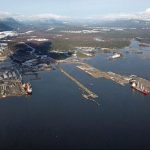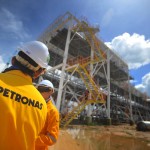Pending a final investment decision this year
From Reuters/CBC
The chief executive of the LNG Canada project on British Columbia’s northern coast said on Tuesday that the company was committed to starting construction on the $40 billion liquefied natural gas export project this year.
An investment decision on the terminal in Kitimat, B.C., was delayed in 2016, due to sagging oil prices that hit cash flows, along with an unfavourable supply-demand outlook, but remains on track for 2018, Andy Calitz said at an LNG conference on Tuesday.
“It didn’t make sense in July 2016,” he said. “When [our stakeholders] asked the inevitable question, when will you reconsider the FID? Our answer was: We will be in construction in 2018. I reaffirm that commitment today.”
Calitz later told reporters that a trade spat over imported fabricated industrial steel components (FISC) was no longer an issue for the project and would not have any impact on an investment decision by the joint venture partners.
John Horgan offers tax break incentives to $40B Kitimat LNG project
Slight backtrack
As word of Calitz’s comments spread, LNG Canada issued a statement, reiterating the fact that no final investment decision has yet been made.
“LNG Canada is currently preparing to submit a Decision Support Package for review by our Joint Venture Participants (JVPs) later this year. However, the exact date for an FID is up to the JVPs to make,” said director of external relations Susannah Pierce.
B.C. Energy Minister Michelle Mungall made the same observation but said the government was “very encouraged” by Calitz’s comments.
“It’s good to see that so many people in B.C., investors as well, are excited to see these types of projects go forward,” she said, adding that the government’s offer of providing a break on carbon taxes and an exemption on provincial sales taxes related to construction costs played a key role.
“We know the framework was very important to this. We need to make sure that B.C. is competitive.”
Tariffs no longer an issue
LNG Canada had asked Canada’s Finance Ministry to exempt it from the 45.8 percent anti-dumping tariffs, which apply to certain FISC components imported from Spain, South Korea and China. LNG trains, most of which are built in Asia, are FISC components.
Calitz did not make clear why the FISC duties were no longer an issue, but said the modules have been contracted and the company has more clarity on the parameters and legal application of the tariffs.
LNG Canada is a joint venture between Royal Dutch Shell Plc (RDSa.L), PetroChina Co Ltd (601857.SS), Mitsubishi Corp (8058.T) and Korea Gas Corp (036460.KS). TransCanada Corp (TRP.TO) will build the pipeline.
TransCanada Will Begin Gas Pipeline Construction in 2019 if LNG Canada Makes FID
Construction on the $4.8 billion Coastal GasLink pipeline will start in 2019 pending a positive final investment decision on the LNG Canada project, executive says
VANCOUVER — Construction on TransCanada Corp’s $4.8 billion (US$3.8 billion) Coastal GasLink pipeline will start in early 2019, pending a positive final investment decision on the linked LNG Canada project, the head of the pipeline project said on Wednesday.
The comments followed a commitment from the chief executive of LNG Canada on Tuesday that the $40 billion liquefied natural gas export terminal would be under construction in 2018. A final investment decision, or FID, from the project partners is expected this year.
“We would be looking at constructing in the early part of 2019,” Coastal Gaslink President Richard Gateman told reporters at an LNG conference. “We could be doing a little bit of field work in the fall (of 2018), if there’s a FID decision.”
TransCanada’s 670-km (415-mile) Coastal GasLink pipeline will cross two mountain ranges to connect rich shale fields in Alberta and northeast British Columbia with the proposed LNG Canada export terminal on British Columbia’s northwest coast.
If the project goes ahead, it will be a game changer for Canada’s natural gas producers, which currently face steep discounts for their product because of sagging demand in the United States and a lack of other export markets.
TransCanada expects to award contracts for the construction to four consortiums within the next two months, Gateman said. Those contractors will be a mix of local and international players with experience building in mountainous terrain, he said.
U.S., Japanese-based firms named as prime contractor for B.C. LNG plant
Shell’s $14-billion contract for Kitimat project a sign B.C. may catch the second LNG wave
Ottawa offers financial backstop for Trans Mountain pipeline amid continued pushback in B.C.
The company also expects to provide a cost update around the same time, he said, adding: “I’ll say that that was an estimate in 2011 dollars and if you take that to 2018 dollars, it’s a little bit more, but it’s not substantially more.”
The $4.8 billion price tag in 2011 dollars would equate to $5.3 billion now, according to the Bank of Canada inflation calculator.
Bateman also said TransCanada had worked hard to keep costs down on the project, just as the LNG Canada partners have worked to bring down costs on the terminal project.
“We contributed our part in terms of the pipeline budget and they did their part on the facility, which is why it looks like it is successfully coming together,” he said.
TransCanada will own and operate the pipeline.





